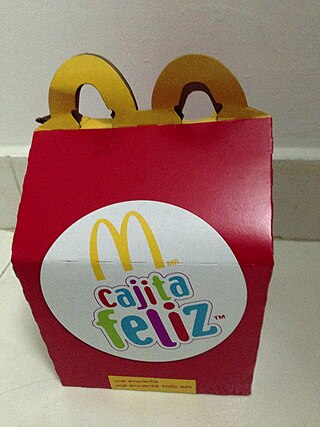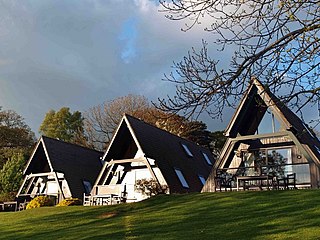
A club is an association of people united by a common interest or goal. A service club, for example, exists for voluntary or charitable activities. There are clubs devoted to hobbies and sports, social activities clubs, political and religious clubs, and so forth.
Discounts and allowances are reductions to a basic price of goods or services.

A Happy Meal is a kids' meal usually sold at the American fast food restaurant chain McDonald's since June 1979. A small toy or book is included with the food, both of which are usually contained in a red cardboard box with a yellow smiley face and the McDonald's logo. The packaging and toy are frequently part of a marketing tie-in to an existing television series, film or toyline.

A timeshare is a property with a divided form of ownership or use rights. These properties are typically resort condominium units, in which multiple parties hold rights to use the property, and each owner of the same accommodation is allotted their period of time. Units may be sold as a partial ownership, lease, or "right to use", in which case the latter holds no claim to ownership of the property. The ownership of timeshare programs is varied, and has been changing over the decades.

The luxury box and club seating constitute the most expensive class of seating in arenas and stadiums, and generate much higher revenues than regular seating. Club ticketholders often receive exclusive access to an indoor part of the venue through private club entrances, to areas containing special restaurants, bars, merchandise stands, and lounge areas of the venue that are not otherwise available to regular ticketholders.
A season ticket, or season pass, is a ticket that grants privileges over a defined period of time.
In the leisure industry, a destination club is a form of timeshare system where members pay a membership deposit and annual dues to access the club's properties.
Club Nintendo was a customer loyalty program and magazine that was provided by Nintendo. The loyalty program was free to join and provided rewards in exchange for consumer feedback and loyalty to purchasing official Nintendo products. Members of Club Nintendo earned credits or "coins" by submitting codes found on Nintendo products and systems, which could be traded in for special edition items only available on Club Nintendo. Rewards included objects such as playing cards, tote bags, controllers, downloadable content, and warranty extensions on select Nintendo products.
DefCom Australia is a loyalty card purchasing scheme for:
Zwaggle is a community of parents who gather online to share their children's gently-used toys, clothing, books, gear and more with other families. Instead of using cash to buy or sell items, members post items to Zwaggle and use points, called Zoints, to release and/or accept items. By participating, parents de-clutter their homes of unwanted things that are still useful and in doing so save money, conserve material/natural resources and continue the life-cycle of products instead of relegating them to a landfill.
Outside The Nine is the official fan club of American heavy metal band Slipknot, and was launched in 2005. The fan club is an online community which offers members an array of privileges at an annual subscription fee.

Clone Wars Adventures was an online virtual world based on the animated television series Star Wars: The Clone Wars. Players could create and customize in-world avatars and participate in a variety of Clone Wars-themed mini-games and activities, earning Republic credits to purchase new weapons, outfits, ships, and furniture. Clone Wars Adventures was free to download and play, but only those that had a paid membership got access to a majority of the game's features. Additionally, many outfits and premium items could only be purchased with Station Cash, a form of in game currency that players needed to purchase with real money instead of in-game credits. This massively multiplayer online game follows a similar business model to Free Realms. However, unlike Free Realms, the game was released at retail, though the game is free-to-play.

NRL Mascot Mania is a National Rugby League video game, developed by Wicked Witch Software for Nintendo DS. It was released in July 2009.

Promotional merchandise are products branded with a logo or slogan and distributed at little or no cost to promote a brand, corporate identity, or event. Such products, which are often informally called promo products, swag, or freebies, are used in marketing and sales. Often they are of the tchotchke type. They are given away or sold at a loss to promote a company, corporate image, brand, or event. They are often distributed as handouts at trade shows, at conferences, on sales calls, and as bonus items in shipped orders. They are often used in guerrilla marketing campaigns. Ones for video games are often called feelies.
Marriott Vacations Worldwide Corporation is a pure-play public timeshare company. Formerly a division of Marriott International, Marriott Vacations Worldwide was established as a separate, publicly traded entity focusing primarily on vacation ownership in November 2011. Marriott Vacations Worldwide runs more than 120 resorts with over 700,000 owners and members. Its brands include Marriott Vacation Club, Marriott Vacation Club Pulse, Grand Residences by Marriott, and The Ritz-Carlton Destination Club. The company also operates Interval International, which offers an exchange network and travel membership programs through a network of more than 3,200 affiliated resorts in over 90 countries and territories.

tastecard is a discount card accepted by many restaurants in the UK and Ireland offering typically a 50% discount or two meals for the price of one at participating restaurants; details and restrictions vary from restaurant to restaurant and are listed on the website. It is implemented by a physical card the same size as a credit card or a "digital card" on a mobile phone. Both chain and independent restaurants, some with a Michelin star, accept tastecard. Discounted pizza delivery and cinema tickets are also available. The price of annual membership as of 2023 was £34.99, often with a trial period available free or at nominal cost.
MiniMonos was a virtual world for children six and above. Players created a monkey avatar on MiniMonos, socialized with other monkeys, and played mini games. The game incorporated themes of environmentalism and encouraged "green" activities among its players, both online and offline. The game was popular with children around the world, particularly in the UK, US, Australia and New Zealand, where the game was invented. The game closed on 12 May 2013.

Bin Weevils was a British MMORPG involving a virtual world containing a range of online games and activities.
ThirdHome is a global home exchange service, specializing in luxury properties, founded by Wade Shealy in 2010. With its headquarters in Brentwood, Tennessee, United States, the company operates internationally, positioning itself uniquely to cater exclusively to owners of second homes.
The retail format influences the consumer's store choice and addresses the consumer's expectations. At its most basic level, a retail format is a simple marketplace, that is; a location where goods and services are exchanged. In some parts of the world, the retail sector is still dominated by small family-run stores, but large retail chains are increasingly dominating the sector, because they can exert considerable buying power and pass on the savings in the form of lower prices. Many of these large retail chains also produce their own private labels which compete alongside manufacturer brands. Considerable consolidation of retail stores has changed the retail landscape, transferring power away from wholesalers and into the hands of the large retail chains.








